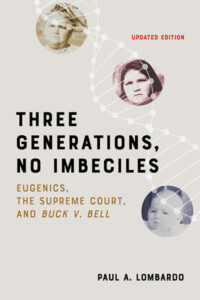 Any discussion of eugenics today – or for that matter even mentioning the word “eugenics” without spitting on the floor and cursing afterword to make one’s revulsion to it clear – is fraught with peril indeed. Should such a discussion be attempted, one of two phrases, and perhaps even both, are likely to be mentioned almost right from the start: national socialism and Buck v. Bell. Regarding the latter for those who might not be familiar with it (I’m going to make the assumption that everyone who will read this has heard of the Nazis), Buck v. Bell was the 1927 U.S. Supreme Court case that allowed states to “forcibly sterilize residents in order to prevent “feebleminded and socially inadequate” people from having children” in which Justice Oliver Wendell Holmes Jr. made his famous statement “three generations of imbeciles are enough.”
Any discussion of eugenics today – or for that matter even mentioning the word “eugenics” without spitting on the floor and cursing afterword to make one’s revulsion to it clear – is fraught with peril indeed. Should such a discussion be attempted, one of two phrases, and perhaps even both, are likely to be mentioned almost right from the start: national socialism and Buck v. Bell. Regarding the latter for those who might not be familiar with it (I’m going to make the assumption that everyone who will read this has heard of the Nazis), Buck v. Bell was the 1927 U.S. Supreme Court case that allowed states to “forcibly sterilize residents in order to prevent “feebleminded and socially inadequate” people from having children” in which Justice Oliver Wendell Holmes Jr. made his famous statement “three generations of imbeciles are enough.”
Prof. Paul Lombardo took up an examination of the case, its ramifications, and subsequent reviews of the evidence following its being handed down, and published his research findings in the 2008 book Three Generations, No Imbeciles: Eugenics, the Supreme Court, and Buck v. Bell from Johns Hopkins University Press. However since this 2008 book was published, even more information has come to light, and further review of the facts in the case have moved him to update his original book, which has as of this past February been published under the same title in an updated edition.
This new edition includes new letters pertaining to the case, direction to a digital archive of related documents, and perhaps most significantly, a “completely new afterword, “Looking Back at Buck,” that explains how the case remains a key feature of public discourse about disability, government power, and reproductive rights.” Indeed, for those interested in the history of medicine, regulation of reproduction, and the rights of those under state supervision, this is a book of which to take notice.
If you enjoyed reading this, please consider signing up for The Well-read Naturalist's newsletter. You'll receive a helpful list of recently published reviews, short essays, and notes about books in your e-mail inbox once each fortnight.
